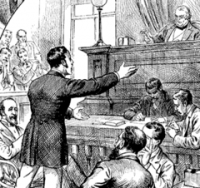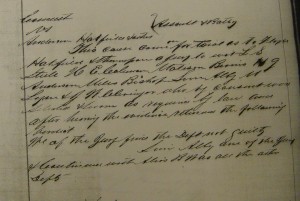Because they know the definition of the word “feud,” the feud yarn-spinners put in enough apocryphal incidents to give the reader a story of continuing violence, from at least the hog trial in 1878 until the hanging of Ellison Mounts in 1890. They give footnotes to create the appearance of a foundation for the events, but the footnotes are almost always to some previous yarn-spinner. Some, like Lisa Alther, obviously never saw the records, while others, such as Otis Rice and Dean King must have seen the records, because they cite them occasionally, among the much more common citations of prior yarn-spinners.
Writing about the early 1880s, Otis Rice wrote: “The Hatfields occasionally rode to Pikeville, but they traveled in companies adequate for their protection and were heavily armed.” (p. 30)
Writing about the months following the arrest of Johnse Hatfield and his liberation by Devil Anse’s posse, Dean King wrote: “Like so many other Hatfield-McCoy clashes, this one and its ensuing accustions would go unresolved. Kentucky law officers ultimately refused to deal with the interstate legalities or to attempt to detain the Hatfields.”
So, there you have it: According to both the historian, Rice, and the novelist posing as a historian, King, the Hatfields and McCoys were lawless people, who paid no attention to the law. They crossed the state line and committed crime with impunity, and then returned to their sanctuary on the other side of the Tug. Furthermore, the Kentucky law was so scared of the terrible Hatfields that they wouldn’t even attempt to “detain the Hatfields.”
In October, 1880 Tolbert and Bud McCoy arrested Johnse Hatfield on a Pike County charge of carrying a concealed weapon. King has Bud not there, and Jim and Ran’l in the posse, but he knows he is lying, because he has obviously seen the records.
Lets look at just a couple of records that show just how far from the truth Mr. King strays in his attempt to portray an uncivilized and depraved people: I don’t know whether Johnse went to Pikeville alone after he was sprung from the McCoy brothers, or if his father accompanied him to insure his safety, but I do know that on October 14, 1880, he stood trial for the offense. He was convicted and fined twenty-five dollars and given ten days in the county jail. Here is the record:
The case starts at the bottom of one page, seen above, and carries over to the following page:
Now, for the claim that the Pike authorities didn’t even try to detain the dangerous Hatfields: Elias and Floyd were arrested and tried for allegedly participating in Johnse’s liberation from the custody of Tolbert and Bud McCoy.
Far from being beyond the reach of the law, Elias and Floyd indeed showed up to face the music. Two of Tolbert’s close McCoy relatives testified FOR the accused Hatfields. Lo, and behold! The jury of twelve Pike County men found the West Virginia Hatfields NOT guilty! So, we see Elias and Floyd Hatfield coming to Pikeville and standing trial during precisely the time King claims that the Hatfields were beyond the reach of the courts.
Here’s the the court record on Floyd’s trial:
Dean King undoubtedly saw these records during his “four years of intensive research.” Therefore, the prevarication is deliberate, and it is done to deceive his readers. And people wonder why I call Dean King a liar!


